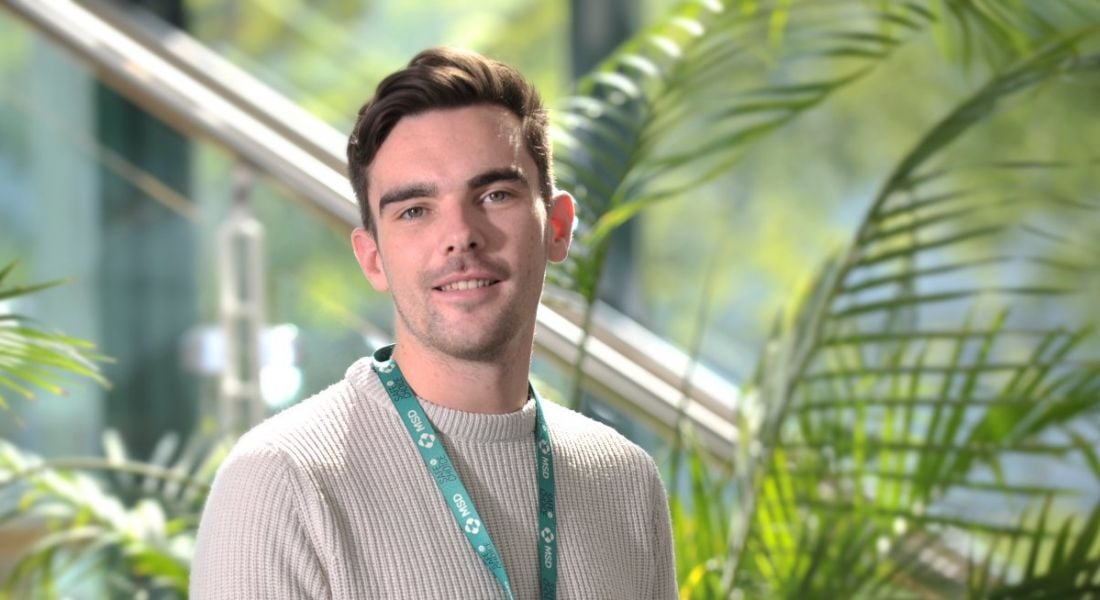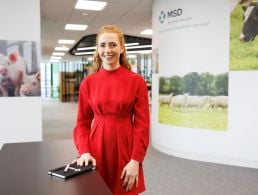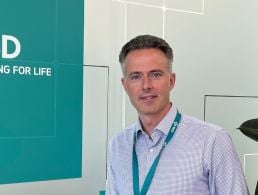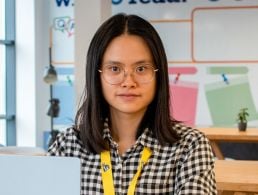A graduate programme is the perfect opportunity to learn as much as possible and kick off your career development.
Taking your first career steps can be an exciting time, particularly when it comes to working in a pharma company such as MSD.
Declan McEnroy graduated from Dublin City University (DCU) earlier this year and started working at MSD’s Carlow site, having spent time there as an intern during his third year.
Here, McEnroy shares his experience as a graduate, what it’s like working at MSD and the unique opportunities he has had to meet the patients that are directly impacted by his work.
What did you study in college?
In 2018, I graduated from DCU with an honours degree in biotechnology. The course involved a wide range of science and engineering subjects, from advanced cell biology to bioprocess engineering.
The course focused on how fundamental underlying biological systems work, and to appreciate how these systems can be used in solutions and translated to a commercial scale.
With this programme, are you now working in your desired industry?
The MSD Carlow graduate programme is a two-year programme that has three core rotations built into it. You spend time working within the operations, quality and technical engineering departments.
At MSD Carlow, I’m now working in my desired industry and able to apply the skills and knowledge I obtained at DCU to help develop and manufacture products that make a difference.
What drew you to MSD when you were seeking work as a graduate?
I originally started working at MSD Carlow as an intern through the DCU industrial training programme (INTRA) in my third year of college. During my internship, I spent six months working as part of the quality assurance team, assisting operations.
MSD Carlow then visited DCU to showcase the great work taking place at the site and in particular the opportunities the graduate programme offers.
After the internship, there were many reasons I was keen to return as a graduate, such as the people, the culture within the site, the career development opportunities and, most importantly, the work we are doing that allows us to focus on helping patients.
What expectations did you have before you began the programme?
I expected that I would develop a core understanding of what the day-to day-duties entailed while working within the operation, quality or engineering team, and to complete projects within each department.
All of these expectations were met. I was given opportunities to work in projects that had cross-functional teams and to take part in several training programmes.
What duties and responsibilities were you given initially?
I was assigned to my first rotation in the technical engineering department, and the first month was spent getting to know my new team and undertaking training on all relevant procedures.
I was given the chance to prove myself, provide input straight away, and given deadline-oriented tasks to complete for specific project teams who were very helpful and extremely willing to share their knowledge and expertise.
Did the scope of your work change as the programme progressed?
As I progressed through my rotation in the technical engineering department, I enhanced my learning and was allowed to rationalise problems and come up with solutions independently.
I was also given the opportunity to apply for and progress to a permanent role within the department.
Can you describe a typical day in your role?
It’s hard to call any day ‘a typical day’ as I rarely find any two days the same. However, there is a slight structure to my day.
Every morning starts off with a tier meeting with your team. Currently, I am working on the new product introduction team. A typical morning could range from planning daily meetings, to heading to the manufacturing floor to address any issues raised during the night.
The afternoon might consist of brainstorming sessions for new product development, or global calls with colleagues in MSD sites across the world to coordinate and plan activities required for process introduction or development.
How do your responsibilities compare to more experienced employees’?
I find my responsibilities are similar to colleagues with more experience. When given new tasks to complete, the more experienced employees within my department are willing to support newer team members. This ensures that you acquire great experience from the get-go but with support from your colleagues.
The work at MSD Carlow right now is very exciting; there are always new tasks that arise that I have never seen before.
Do you feel more prepared for working life after completing this programme?
The programme itself is very representative of working life. It gives you the ability to adapt yourself as required while also helping you to understand how to effectively use your time. With anything in life, you get in what you put out.
Why should someone apply to the graduate programme at MSD?
There are three reasons why I would encourage someone to apply for the graduate programme here, and in fact any position at the site: the culture, the development opportunities and the patient focus.
Firstly, MSD Carlow’s culture is heavily focused on its staff’s wellbeing, from its strong emphasis on staff safety to participation on team social outings or the organisation of health awareness days, including mental health.
Secondly, MSD Carlow itself is a young site, which is still rapidly increasing, so it offers great development opportunities. From working as an intern in the quality department right through to my current role today, I have been given the opportunity to develop new skills and processes. I have found in MSD, if you are willing to learn, there will always be an opportunity to further develop yourself.
Finally, and most importantly, at the heart of every critical decision made on site is patient focus. During my time here, I have been fortunate to hear about how the products manufactured on site have made huge differences to people’s lives. Opportunities like these to meet the patients that are directly impacted by your work provide huge job satisfaction and motivation.




